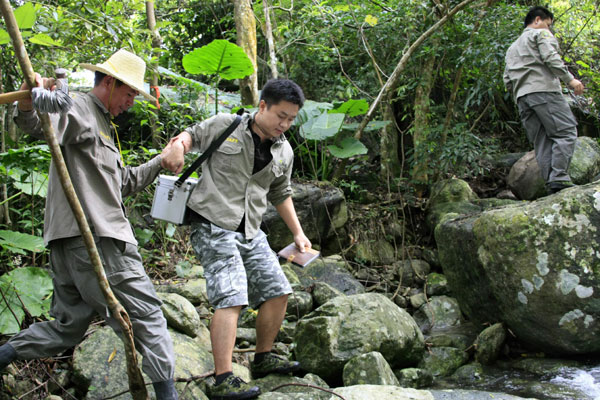Back to nature
Updated: 2012-08-30 08:06
By Huang Yiming in Haikou and Liu Xiangrui in Beijing (China Daily)
|
|||||||||||
Hainan's Yinggeling Natural Reserve is benefiting from a scientific research and management base built in the biologically diverse tropical forest, report Huang Yiming in Haikou and Liu Xiangrui in Beijing.
Unlike most of her classmates who competed to stay in the cities, Xu Biguo made her way directly from the city to the secluded mountains of Hainan province in 2007.
Xu, 28, is one of 27 college graduates, two with doctorates, who work at Hainan's Yinggeling Natural Reserve and built a scientific research and management base out of virtually nothing over the past five years.
 |
|
Workstation members at Hainan's Yinggeling Natural Reserve trek in the tropical forest as part of a research project. Huang Yiming / China Daily |
The reserve, located in central Hainan's mountainous region, covers an area of 500 square kilometers.
It is regarded as the "lungs" of the island province, whose two largest rivers originate there. Its biologically diverse tropical forest is the largest of its kind in China.
The Hainan Bureau of Forestry decided to establish a workstation in the reserve and started to recruit graduates from universities around the country in 2007.
Majoring in ornamental horticulture at university, Xu, who found the work not far from her hometown, applied and became one of the six "early arrivals".
"I had worries before I came. And to be honest, I was a little disappointed when I first got here," Xu says. "I expected an office building at least."
Both the working and living environments were tough in the beginning, Xu recalls.
The station was paid for from the provincial government's allocation fund for the ecological forest in the reserve.
However, due to insufficient funds, there were just two simple dormitories and thatched houses were rented from farmers to provide accommodation.
Xu is responsible for administrative work, but due to a shortage of hands she also prepares food and tents for colleagues and takes care of the facilities.
"I'm the 'housekeeper' and do practically everything," Xu explains.
Average income is less than 2,000 yuan ($315) a month, though Xu earns slightly more because she is senior.
For some young members, living and working in such an environment can mean both physical and mental challenges.
Wang Hesheng, who graduated as an insect classification major, was attracted to the reserve because of its biological diversity, in 2007. The young man often spends days in the forests observing insects.
For him, mosquito and other insect bites, and snake attacks, are common threats in the tropical forests.
One time, when he was recording insects, a snake's head jutted out from behind a branch. He immediately stopped moving, knowing snakes have poor hearing but are sensitive when it comes to smell and movement. He stood still for a minute.
"I was able to get away from the snake safely. But I was scared when I found out that there were leeches on my legs," he says.
"My colleagues are all well disciplined. So I am more nervous if there is rain or a typhoon holding up research teams from returning," says Huang Guochang, the head of the workstation.
"Often there are no phone signals in the mountains when it rains and we lose contact with them."
Isolation is a test for the members as the nearest county town is 30 km away and they may not have TV or even a phone signal.
Xu says female colleagues sometimes complain about homesickness. "Sometimes we joke that we have devoted our youth to Yinggeling."
Compared with colleagues from inland provinces, Xu has an advantage, with her hometown in nearby Qionghai. But she hardly has time to go there.
Xu has met with occasional opposition from her family, who advised her to work in a more convenient place. But Xu confides the five-year plan laid out by the first station head gave her confidence for the future.
"Now all things in the plan have been realized, step by step," says the woman, who married this year and will soon be a mother.
"I won't regret my choice. I'm proud to do something for environmental protection, though I earn less and have a less colorful life here than in the cities."
The group has welcomed new members during the years, but all share a harmonious relationship.
"We don't feel lonely because we have so many young people who share the same goals. That's why we have stayed," says Liao Changle, who joined the group in 2010.
"We keep talking and joking with teammates on our way to work in the mountains. I love this job and find my life rather substantial," Liao says.
The station has established seven departments, four branch stations, and three forest ranging points, as well as a research monitoring station.
After five years of efforts, their station has finished an important biology archive project, with a number of rare and protected animals and plants recorded.
Today's Top News
President Xi confident in recovery from quake
H7N9 update: 104 cases, 21 deaths
Telecom workers restore links
Coal mine blast kills 18 in Jilin
Intl scholarship puts China on the map
More bird flu patients discharged
Gold loses sheen, but still a safe bet
US 'turns blind eye to human rights'
Hot Topics
Lunar probe , China growth forecasts, Emission rules get tougher, China seen through 'colored lens', International board,
Editor's Picks

|

|

|

|

|

|





